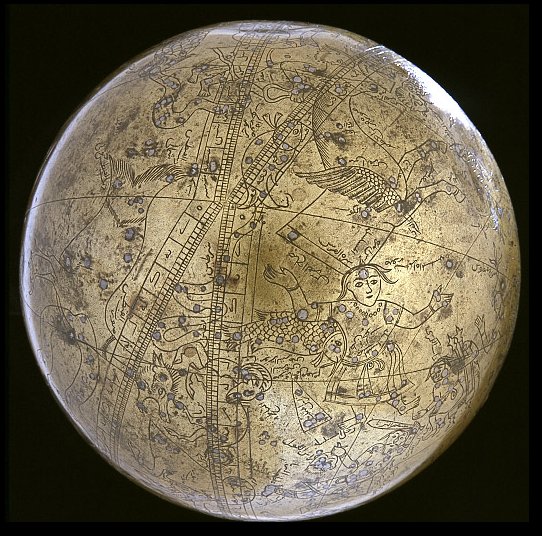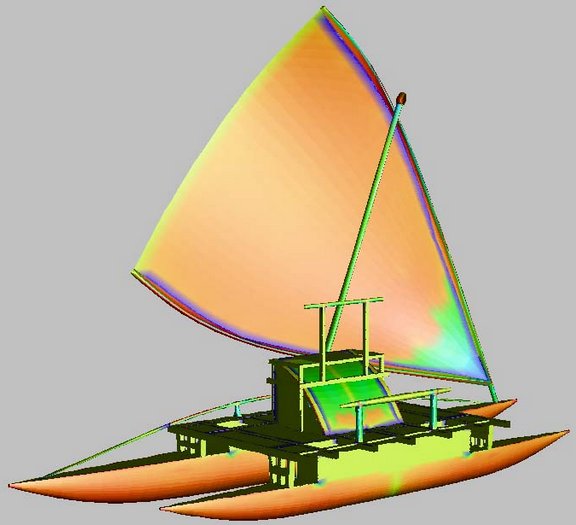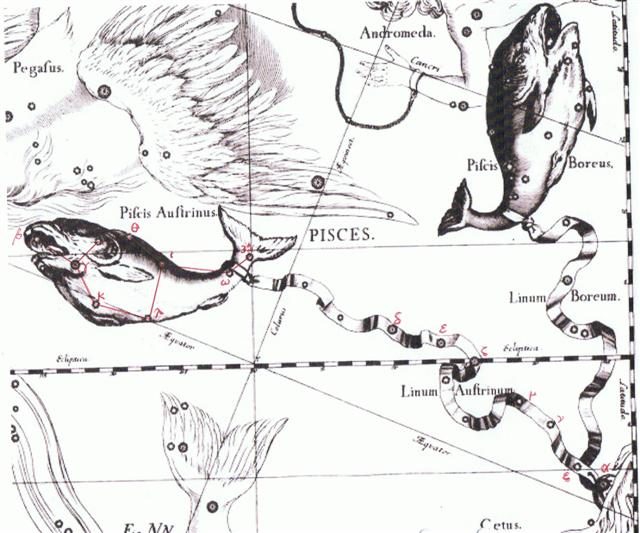Whereas far in the north
Raven first mishandled his sticks so
they bounced apart

and then had to follow
the instructions of the Old Man who had
'Fire' (Saturn), Manuscript E tells of
another kind of separation before the
birth of land. I think it is necessary
to here document a long stretch of the
text:
... The canoes of
Ava Rei Pua and of Hotu
were seen near the (off-shore)
islets. On the fifteenth day of the
month of October (tangaroa
uri) the canoe of Hotu
and the canoe of Ava Rei Pua
landed. On the fifteenth day of the
month of October (tangaroa
uri), Nonoma left the
house during the night to urinate
outside. At this point Ira
called out to Nonoma, 'Look
at the canoe!' Nonoma ran, he
quickly went to Te Hikinga Heru
(a ravine in the side of the crater
Rano Kau) and looked around.
There he saw the double canoe way
out near the (offshore) islets, and
the two (hulls of the canoe) were
lashed together.
He ran and returned to
the front of the house. He arrived and
called into the house: 'Hey you! This
canoe has arrived during the night
without our noticing it!' Ira
asked Nonoma, 'Where is the
canoe, which you say is lying out there
(in the water)?' Nonoma's voice
came back: 'It is out there (in the
water) close to the (offshore) islets!
There it lies, and the two (hulls) are
lashed together.'
The four of them
(corrected for 'the six of them') went
out and picked up leaves (on branches)
to give signals. They picked them up,
went and arrived at Te Hikinga
and saw the canoe. Raparenga got
up, picked up the leaves, took them in
his hands, and waved, waved, waved,
waved.
This was seen by the man
who understood signals; he looked down
and called out the following to the
king: 'They are waving, they are
signaling the following message: 'The
land is bad, the shoots growing out of
the ground cannot spread because the
algae-like thicket is very long when it
is pulled out, when it is ripped out!'
(This means that the runners of the yam
roots that were planted are unable to
prevail against the heavy weeds, which
have to be pulled out continually.)
King Hotu called
to Tuki, 'Sígnal and answer the
following: The homeland is bad too,
(because there) the flood brings
destruction and the low tide brings
relief (this is a reference to the
losses caused in Hiva by the
rising of the water, or rather, by the
subsidence of the land.)
(In the meantime) Ira
and Nga Tavake had arrived.
Tuki signaled and answered the
message in this manner - he waved and
waved. The signal arrived up (at the
cliffs) where Raparenga was. He
looked out and watched for it. Then the
waving stopped (?).
Ira asked, 'Why
did they send signals?' Raparenga
replied, 'Because we sent signals
first'. Ira said, 'We have lost
the bad news for you (which means, we
have warned you in vain).' Ira
said to Raparenga, 'Give signals
and tell this: If the canoe continues to
the right side (of Easter Island, seen
from Motu Nui), they should sail
way out because of Tama, an evil
fish with a very long nose (this is a
wordplay with the place name on the
southeastern shore, which 'demands bad
victims because of its cliffs').'
He waved, waved, waved,
waved.
The ones on board the
boat saw Raparenga's waving and
understood. The signals arrived on board
the canoe; the waving arrived below
(i.e., in the west)." (Manuscript E as
translated in The Eighth Island.)
There were (4 + 2) +
2 = 8 wavings (rapu) from
Raparenga and 2 from Tuki
in response. 8 + 2 = 10. Up to now I
thought I had no item rapu in
my word list and that this had to be
remedied. First I searched in the
Wehewehe internet site and
found:
|
lapu
1. Ghost
... apparition, phantom,
specter; haunted; to haunt;
to act as a ghost. Ua
lapu
ke keiki a kāua ia'u, I
have been haunted by our
child.
Ho'o
lapu, to pretend
to be a ghost, as children
on Hallowe'en. 2. Haunted.
Hale
lapu,
haunted house, not the
Halloween variety. Kiliki
o
lapu, trick or
treat. Wehewehe. |
Then I consulted
Fornander:
|
Lapu,
s. Haw., ghost,
apparition of some one dead,
night-monster; lapu-lapu,
v. to collect
together in small heaps, to
pick up, as sticks for a
faggot; lapu-wale,
lit. 'only a ghost', nothing
substantial, foolish,
worthless; akua-lapu,
a spectre.
N. Zeal.,
rapu, to search for.
Tah., rapu,
ta-rapu, to mix
together, squeeze, scratch,
be in confusion. Fiji,
ravu, to kill, smash,
break.
Sanskr.,
ribhu, i.e., rabh-u
(Benfey), name of certain
deities; according to
Pictet, good spirits in the
Vedic mythology; rabh,
to seize, to take; rabhas,
zeal. Lat., rabies,
rage, frenzy. Welsh,
rhaib, fascination;
rheibus, a sorcerer, a
witch.
Touching the
Sanskrit rbhu, Pictet
(Orig. Ind.-Eur., ii. 607)
says: 'Leur nom comme
adjectif, signifie habile,
adroit, inventif, et, comme
substantif, artisan habile
surtout à forger et à
construire des chars. Il
dérive de la rac. rabh,
temere, ægere,
avec à préf., ordiri,
incipere. Cf. rbhva,
rbhvan, hardi,
entreprenant, adroit.
Lassen, le
premier, a rapproché de
rbhu le Grec
'Ορφευς,
tout en avouant que les
traditions relatives au
chantre thrace n'offrent
aucun rapport avec celles du
Rigveda. Kuhn adopte
ce rapprochement, en
cherchant dans les Elfes de
Germanie, grand amateurs de
musique et de chant, un
châinon qui relie Orphée aux
rbhus de l'Inde.
Si l'on part, en effet,
d'une forme arbh =
rabh, dont le dérivé
rbhu serait un
affaiblissement, il devient
facile d'y rattacher, avec
Kuhn, , le scand. älfr,
ags. ælf, anc. all.
alp, &c., nom d'une
classe d'esprits qui
tiennent une grande place
dans la mythologie du Nord,
et les superstitions
populair de l'Allemagne et
de l'Angleterre.
Leurs attributs sont plus
variés que ceux de leurs
confrères de l'Inde, et leur
sphère d'action est plus
étendue. Ils se divisent en
plusieurs classes, les
blancs, les noirs, les gris,
les bruns, suivant leur
caractère bon ou malin; les
une beaux et grandieux, les
autres laids et difformes.
Ces derniers se confondent
plus ou moins avec les
nains, dvergar, qui
se rapprochent des rbhus par
leur habileté comme artisans
et forgerons.
D'un autre côté, les Alfar
lumineux que habitent l'air,
et qui se plaisent à la
musique et à la dance,
ressemblent mieux aux Maruts
indiens, génies de l'air
qui, à leur tour,
s'identifient par plusieurs
points avec les rbhus.
On voit ainsi qu'un fond
commun de croyances, simple
à son origine, s'est
développé plus tard dans
plusieurs directions chez
les Indiens et les
Germains.'
And also with the
Polynesians. (Fornander) |
However, I then
discovered there indeed was an item
rapu in my word list:
|
Rapu
Pau.:
fata-rarapu, to
dissolve. Mgv.: rapu,
to dilute. Ta.: rapu,
to mix. Mq.: ápu, to
draw water. Churchill.
Haw.:
lapu, ghost, apparition
of some one dead,
night-monster; lapu-lapu,
to collect together in small
heaps, to pick up, as sticks
for a faggot; lapu-wale,
lit. 'only a ghost', nothing
substantial, foolish,
worthless; akua-lapu,
a spectre. Mao.: rapu,
to search for. Ta.: rapu,
ta-rapu, to mix
together, squeeze, scratch,
be in confusion. Fiji:
ravu, to kill, smash,
break. Fornander. |
I had mistakenly put
rapu after papa
instead of after rapa.
Possibly the creators
of Manuscript E used the word
rapu as a word play with
ra-pu alluding to the month
Te-Hetu'u-Pu, because Ra
denoted both a sail and the great
star (hetu'u) Sun:
|
He Anakena |
Hora iti |
Hora nui |
Tagaroa uri |
Ko Ruti
|
Ko Koró |
|
'July' |
'August' |
'September' |
'October' |
'November' |
'December' |
|
Tua haro |
Tehetu'upú |
Tarahao |
Vaitu nui |
Vaitu potu |
He Maro |
|
'January' |
'February' |
'March' |
'April' |
'May' |
'June' |
|
Hetu
Hetu 1. To (make)
sound; figuratively:
famous, renowned. 2. To crumble into embers (of a
bonfire). Hetu'u.
Star, planet;
hetu'u popohaga
morning star; hetu'u ahiahi evening star; hetu'u viri
meteorite. Vanaga
Hetu 1. Star (heetuu);
hetu rere,
meteor; hetu pupura,
planet. P Pau.: hetu,
star. Mgv.: etu,
id. Mq.: fetu,
hetu, id. Ta.:
fetu, fetia,
id. The alternative form
fetia in Tahiti,
now the only one in
common use, need not be
regarded as an anomaly
in mutation. It seems to
derive from Paumotu
fetika, a planet.
Its introduction into
Tahiti is due to the
fashion of accepting
Paumotu vocables which
arose when the house of
Pomare came into
power. 2. Capital letter
(? he tu). 3. To
amuse. 4. To stamp the
feet. Hetuhetu,
to calk, to strike the
water. Hetuke,
sea urchin. Churchill. |
|
Raa
Sun;
day; i te raá nei,
today; raá îka,
good day for fishing.
Vanaga. 1. Sun. 2. Day.
3. Time. 4. Name of
sub-tribe. Fischer.
Te
manu i te raá
= comet.
Barthel.
'... The
substitution of the sun
for the sail, both of
which are called ra
or raa in
Polynesia, is a
remarkable feature in
Easter Island art ... '
Heyerdahl 3.
1. The
sun;
raa ea mai,
raa puneki,
sunrise;
raa tini,
raa toa,
noon. P Mgv., Ta.:
ra, the
sun. Mq.:
a, id. 2.
Day, date;
a raa nei a,
to-day, now;
raa i mua,
day before. P Mgv., Ta.:
ra, a day.
Mq.:
a, id.
Churchill.
'... The chief thus
makes his appearance at
Lakeba from the
sea, as a stranger to
the land. Disembarking
at the capital village
of Tubou, he is
led first to the chiefly
house (vale levu)
and next day to the
central ceremonial
ground (raaraa)
of the island ...'
(Islands of History)
Ta.: toraaraa,
to raise up. Churchill
2. |
LA,
s.
Haw.,
sun,
light,
day.
N.
Zeal.,
ra,
sun,
day.
Marqu.,
a,
id.
Sam.,
la,
id.
Deriv.:
Haw.,
lae,
be
light,
clear,
shining;
lai,
shining
as
the
surface
of
the
sea,
calm,
still;
laelae
and
lailai,
intens.
Sam.,
lelei,
something
very
good;
lala,
to
shine;
lalangi,
to
broil.
Fiji.,
rai,
to
see,
appear;
rai-rai,
a
seer,
a
prophet.
Teor.,
la,
sun.
Aru
Islands,
lara,
id.;
rarie,
bright,
shining.
Amblaw.,
laei,
sun,
day.
Irish,
la,
lae,
day.
Laghmani
(Cabul),
la'e,
day.
Sanskr.,
laj,
lanj,
to
appear,
shine;
râj,
to
shine.
Ved.,
to
govern;
s.
a
king.
If,
as
Benfey
intimates,
the
Sanskrit
verb
bhrâj,
to
shine,
to
beam,
is
'probably
abhi-râj',
an
already
Vedic
contraction,
then
the
Polynesian
root-word
al
and
lae
will
reappear
in
several
of
the
West
Aryan
dialects.
Lat.,
flagrare,
flamma,
flamen.
Greek,
φλεγω,
φλοξ.
A.-Sax.,
blac,
blæcan,
&c.
Probably
the
universal
Polynesian
lani,
langi,
rangi,
ra'i,
lanits
(Malg.)
designating
the
upper
air,
sky,
heaven,
and
an
epithet
of
chiefs,
refers
itself
to
the
same
original
la,
lai,
lanj,
referred
to
above,
to
which
also
be
referred:
Welsh,
glan,
clean
pure,
bright,
holy.
Sax.
clæne,
clean,
pure.
Swed.,
ren,
clean.
pure;
grann
(?),
fine,
elegant.
It
may
be
noted
in
connection
with
this
word,
either
as a
coincidence
or
as
an
instance
of
ancient
connection,
that
in
the
old
Chaldean
the
name
of
the
sun
and
of
the
Supreme
Deity
was
Ra,
and
that
in
Egypt
the
sun
was
also
named
Ra.
LA²,
s.
Haw.,
Sam.,
Tong.,
ra.
N.
Zeal.,
the
sail
of a
canoe;
abbreviated
from,
or
itself
an
older
form
of,
the
Fiji.
laca,
a
sail,
also
the
mats
from
which
the
sails
were
made.
Sunda.,
Mal.,
layar,
sail.
Malg.,
laï,
sail,
tent,
flag.
Sanskr.,
lâta
(Pictet),
a
cloth;
latâ
(Benfey),
a
creeper,
a
plant;
lak-taka,
a
rag.
As
mats
and
clothing
in
primitive
times
were
made
of
bark
or
flexible
plants,
the
connection
between
the
Sanskrit
latâ
and
Polynesian
laca,
la,
becomes
intelligible.
Armen.,
lôtig,
a
mantle.
Lat.,
lodix,
a
blanket.
Irish,
lothar,
clothing.
(Fornander)
|

Although Hotu
Matua arrived in the middle
of the month of Tagaroa Uri
and not in Tehetu'upú
this can be explained by
referring to the effects of the
precession. In rongorongo times the true
September equinox was in Hora Nui 22,
when the Full Moon was in Tarahao 23 -
corresponding to the 2nd night of
Bissextum in Roman times:
 |
 |
|
Ga5-10 |
Ga5-11 (121) |
|
Pálida (184.6), Megrez
(184.9) |
Hasta-13 /
Chariot-28 |
|
GIENAH
(185.1), ε Muscae (185.2), ζ
Crucis (185.4), Zaniah
(185.9) |
|
Hora Nui 21 (*184) |
Equinox (265) |
|
ºSeptember 17 (*180) |
18 (261) |
|
'August 25 (237) |
26 (*158) |
|
"August 11 (*143) |
12 (224) |
|
Uttara Bhādrapadā-27
/
Wall-14 |
χ Pegasi (2.1), θ Andromedae
(2.7) |
|
ALGENIB PEGASI (1.8) |
|
Tarahao 22 (81 = 31 + 28 +
22) |
23 (448 = 366 + 82) |
|
ºMarch 19 (78 = 443 - 365) |
20 (444 = 365 + 31 + 28 +
20) |
|
Bissextum (55 = *340 + 80
- 365) |
'Feburary 25 (55 = 22 * 5
/ 2) |
|
"February 10 (*326) |
11 (42 = *327 + 80 - 365) |
I.e., 'August 25
(237) = 'September 17 (260) - 23,
where 23 is the difference between
the Gregorian dates and the dates in
the calendar of Easter Island - with
the 'cyan-blue clashing rocks'
stopped in Roman times.

Hora Nui 21 (264)
is equal to ºSeptember 17 (260)
and then we will find the
calendar night before spring
equinox as Hora Nui 21 (264) +
27 - 4 = 287 (Tagaroa Uri 14).
Hotu Matua arrived to the
3 islets outside Easter Island
when the Full Moon was at day
364 counted from the northern
spring equinox:
|
Nga Kope Ririva A Taanga
|
 |
 |
 |
|
Ga6-3 |
Ga6-4 (144) |
Ga6-5 |
|
no star listed (207) |
τ Bootis (208.2),
Benetnash
(208.5), ν Centauri (208.7),
μ Centauri, υ Bootis (208.8) |
no star listed (209) |
|
Tagaroa Uri 14 |
15 (288) |
16 |
|
ºOctober 10 |
11 (*204) |
12 (285) |
|
'September 17 (260) |
18 |
19 (*182) |
|
"September 3 (246) |
4 |
5 (*168) |
|
no star listed (24) |
no star listed (25) |
ANA-NIA |
|
POLARIS, Baten
Kaitos (26.6), Metallah
(26.9) |
|
Vaitu Nui 14 |
15 (*391) |
16 (472) |
|
ºApril 11 (101) |
12 (*387) |
13 (468) |
|
'March 18 (78) |
19 (*364) |
20 (445) |
|
"March 4 (64) |
5 (*350) |
6 (431) |
 |
 |
 |
|
Ga6-6 |
Ga6-7 |
Ga6-8 (148) |
|
Muphrid (210.1), ζ Centauri
(210.3) |
φ Centauri (211.0), υ¹
Centauri (211.1), υ²
Centauri (211.8), τ Virginis
(211.9) |
Agena (212.1), θ Apodis
(212.5), Thuban (212.8) |
|
Tagaroa Uri 17 (290) |
18 |
19 |
|
ºOctober 13 |
14 |
15 (288) |
|
'September 20 (*183) |
21 (264) |
'Equinox (*185 + 80) |
|
"September 6 |
7 (250) |
8 (*171) |
|
Al Sharatain-1 /
Ashvini-1 /
Bond-16 |
ι Arietis (28.0), λ Arietis
(28.2) |
Alrisha, χ Phoenicis
(29.2), Alamak (29.7) |
|
Segin,
Mesarthim, ψ
Phoenicis (27.2),
SHERATAN, φ Phoenicis
(27.4) |
|
Vaitu Nui 17 (107) |
18 (474 = 108 + 366) |
19 |
|
ºApril 14 |
15 (104 = 59 + 46) |
16 (*25) |
|
'Equinox (80 = 59 + 21) |
22 (*367) |
23 (448 = 366 + 82) |
|
"March 7 (432 = 66 + 366) |
8 (67 = 59 + 22) |
9 (*354) |
Henua in Ga6-8
has its bottom end straight and in
rongorongo times Alrisha (the Knot,
α
Piscium) was at the Full
Moon.

In the time of
Bharani Alrisha rose with the
Sun 354 (= 12 * 29½) nights after
the "March equinox of the previous
year.
|








